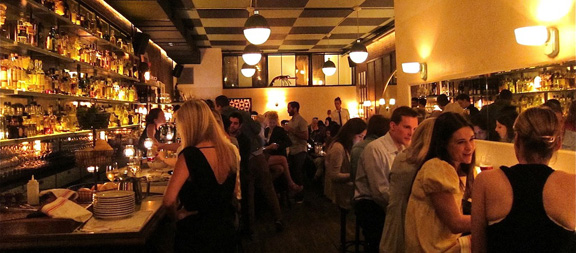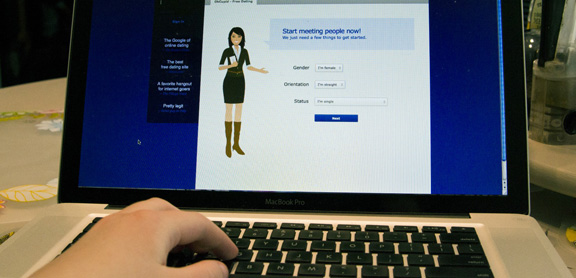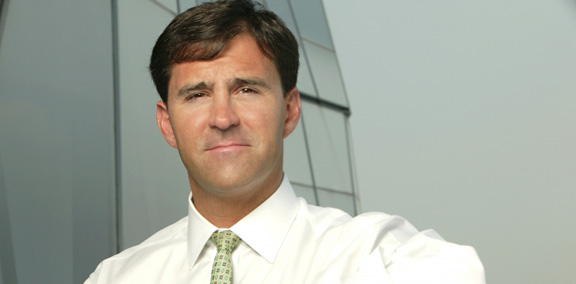The following article from The Atlantic spells out one side of the debate.
A Million First Dates
How online romance is threatening monogamy
By Dan Slater | The Atlantic
After going to college on the East Coast and spending a few years bouncing around, Jacob moved back to his native Oregon, settling in Portland. Almost immediately, he was surprised by the difficulty he had meeting women. Having lived in New York and the Boston area, he was accustomed to ready-made social scenes. In Portland, by contrast, most of his friends were in long-term relationships with people they’d met in college, and were contemplating marriage.
Jacob was single for two years and then, at 26, began dating a slightly older woman who soon moved in with him. She seemed independent and low-maintenance, important traits for Jacob. Past girlfriends had complained about his lifestyle, which emphasized watching sports and going to concerts and bars. He’d been called lazy, aimless, and irresponsible with money.
Before long, his new relationship fell into that familiar pattern. “I’ve never been able to make a girl feel like she was the most important thing in my life,” he says. “It’s always ‘I wish I was as important as the basketball game or the concert.’ ” An only child, Jacob tended to make plans by negotiation: if his girlfriend would watch the game with him, he’d go hiking with her. He was passive in their arguments, hoping to avoid confrontation. Whatever the flaws in their relationship, he told himself, being with her was better than being single in Portland again.
After five years, she left.
Now in his early 30s, Jacob felt he had no idea how to make a relationship work. Was compatibility something that could be learned? Would permanence simply happen, or would he have to choose it? Around this time, he signed up for two online dating sites: Match.com, a paid site, because he’d seen the TV ads; and Plenty of Fish, a free site he’d heard about around town.
“It was fairly incredible,” Jacob remembers. “I’m an average-looking guy. All of a sudden I was going out with one or two very pretty, ambitious women a week. At first I just thought it was some kind of weird lucky streak.”
After six weeks, Jacob met a 22-year-old named Rachel, whose youth and good looks he says reinvigorated him. His friends were jealous. Was this The One? They dated for a few months, and then she moved in. (Both names have been changed for anonymity.)
Rachel didn’t mind Jacob’s sports addiction, and enjoyed going to concerts with him. But there were other issues. She was from a blue-collar military background; he came from doctors. She placed a high value on things he didn’t think much about: a solid credit score, a 40-hour workweek. Jacob also felt pressure from his parents, who were getting anxious to see him paired off for good. Although a younger girlfriend bought him some time, biologically speaking, it also alienated him from his friends, who could understand the physical attraction but couldn’t really relate to Rachel.
In the past, Jacob had always been the kind of guy who didn’t break up well. His relationships tended to drag on. His desire to be with someone, to not have to go looking again, had always trumped whatever doubts he’d had about the person he was with. But something was different this time. “I feel like I underwent a fairly radical change thanks to online dating,” Jacob says. “I went from being someone who thought of finding someone as this monumental challenge, to being much more relaxed and confident about it. Rachel was young and beautiful, and I’d found her after signing up on a couple dating sites and dating just a few people.” Having met Rachel so easily online, he felt confident that, if he became single again, he could always meet someone else.
After two years, when Rachel informed Jacob that she was moving out, he logged on to Match.com the same day. His old profile was still up. Messages had even come in from people who couldn’t tell he was no longer active. The site had improved in the two years he’d been away. It was sleeker, faster, more efficient. And the population of online daters in Portland seemed to have tripled. He’d never imagined that so many single people were out there.
“I’m about 95 percent certain,” he says, “that if I’d met Rachel offline, and if I’d never done online dating, I would’ve married her. At that point in my life, I would’ve overlooked everything else and done whatever it took to make things work. Did online dating change my perception of permanence? No doubt. When I sensed the breakup coming, I was okay with it. It didn’t seem like there was going to be much of a mourning period, where you stare at your wall thinking you’re destined to be alone and all that. I was eager to see what else was out there.”
The positive aspects of online dating are clear: the Internet makes it easier for single people to meet other single people with whom they might be compatible, raising the bar for what they consider a good relationship. But what if online dating makes it too easy to meet someone new? What if it raises the bar for a good relationship too high? What if the prospect of finding an ever-more-compatible mate with the click of a mouse means a future of relationship instability, in which we keep chasing the elusive rabbit around the dating track?
Of course, no one knows exactly how many partnerships are undermined by the allure of the Internet dating pool. But most of the online-dating-company executives I interviewed while writing my new book, Love in the Time of Algorithms, agreed with what research appears to suggest: the rise of online dating will mean an overall decrease in commitment.
“The future will see better relationships but more divorce,” predicts Dan Winchester, the founder of a free dating site based in the U.K. “The older you get as a man, the more experienced you get. You know what to do with women, how to treat them and talk to them. Add to that the effect of online dating.” He continued, “I often wonder whether matching you up with great people is getting so efficient, and the process so enjoyable, that marriage will become obsolete.”
“Historically,” says Greg Blatt, the CEO of Match.com’s parent company, “relationships have been billed as ‘hard’ because, historically, commitment has been the goal. You could say online dating is simply changing people’s ideas about whether commitment itself is a life value.” Mate scarcity also plays an important role in people’s relationship decisions. “Look, if I lived in Iowa, I’d be married with four children by now,” says Blatt, a 40‑something bachelor in Manhattan. “That’s just how it is.”
“As we become more secure in our ability to find someone else … the old thinking about commitment will be challenged very harshly.”
Another online-dating exec hypothesized an inverse correlation between commitment and the efficiency of technology. “I think divorce rates will increase as life in general becomes more real-time,” says Niccolò Formai, the head of social-media marketing at Badoo, a meeting-and-dating app with about 25 million active users worldwide. “Think about the evolution of other kinds of content on the Web—stock quotes, news. The goal has always been to make it faster. The same thing will happen with meeting. It’s exhilarating to connect with new people, not to mention beneficial for reasons having nothing to do with romance. You network for a job. You find a flatmate. Over time you’ll expect that constant flow. People always said that the need for stability would keep commitment alive. But that thinking was based on a world in which you didn’t meet that many people.”
“Societal values always lose out,” says Noel Biderman, the founder of Ashley Madison, which calls itself “the world’s leading married dating service for discreet encounters”—that is, cheating. “Premarital sex used to be taboo,” explains Biderman. “So women would become miserable in marriages, because they wouldn’t know any better. But today, more people have had failed relationships, recovered, moved on, and found happiness. They realize that that happiness, in many ways, depends on having had the failures. As we become more secure and confident in our ability to find someone else, usually someone better, monogamy and the old thinking about commitment will be challenged very harshly.”
Even at eHarmony—one of the most conservative sites, where marriage and commitment seem to be the only acceptable goals of dating—Gian Gonzaga, the site’s relationship psychologist, acknowledges that commitment is at odds with technology. “You could say online dating allows people to get into relationships, learn things, and ultimately make a better selection,” says Gonzaga. “But you could also easily see a world in which online dating leads to people leaving relationships the moment they’re not working—an overall weakening of commitment.”
Indeed, the profit models of many online-dating sites are at cross-purposes with clients who are trying to develop long-term commitments. A permanently paired-off dater, after all, means a lost revenue stream. Explaining the mentality of a typical dating-site executive, Justin Parfitt, a dating entrepreneur based in San Francisco, puts the matter bluntly: “They’re thinking, Let’s keep this [f***er] coming back to the site as often as we can.” For instance, long after their accounts become inactive on Match.com and some other sites, lapsed users receive notifications informing them that wonderful people are browsing their profiles and are eager to chat. “Most of our users are return customers,” says Match.com’s Blatt.
In 2011, Mark Brooks, a consultant to online-dating companies, published the results of an industry survey titled “How Has Internet Dating Changed Society?” The survey responses, from 39 executives, produced the following conclusions:
“Internet dating has made people more disposable.”
“Internet dating may be partly responsible for a rise in the divorce rates.”
“Low quality, unhappy and unsatisfying marriages are being destroyed as people drift to Internet dating sites.”
“The market is hugely more efficient … People expect to—and this will be increasingly the case over time—access people anywhere, anytime, based on complex search requests … Such a feeling of access affects our pursuit of love … the whole world (versus, say, the city we live in) will, increasingly, feel like the market for our partner(s). Our pickiness will probably increase.”
“Above all, Internet dating has helped people of all ages realize that there’s no need to settle for a mediocre relationship.”
Alex Mehr, a co-founder of the dating site Zoosk, is the only executive I interviewed who disagrees with the prevailing view. “Online dating does nothing more than remove a barrier to meeting,” says Mehr. “Online dating doesn’t change my taste, or how I behave on a first date, or whether I’m going to be a good partner. It only changes the process of discovery. As for whether you’re the type of person who wants to commit to a long-term monogamous relationship or the type of person who wants to play the field, online dating has nothing to do with that. That’s a personality thing.” (Source)
—–
The following is a recent interview with the journalist cited in the introductory blog, in which she openly calls for us to dispense with the whole notion of marriage. In doing so, she exposes the logical end to the argument that marriage is not all that important.








